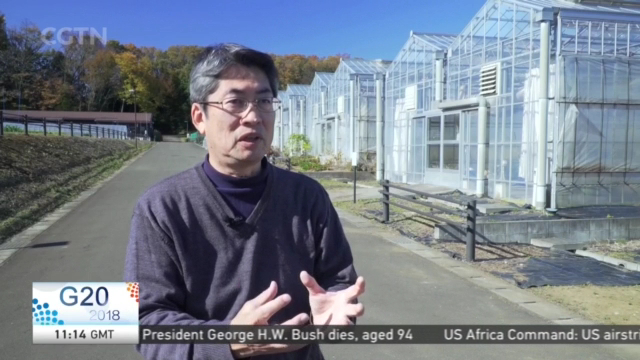
19:56, 01-Dec-2018
Sustainable Food Future: Japan looking overseas to secure its food supplies
Updated
19:00, 04-Dec-2018
02:46

A sustainable future for food is one of the themes at this year's G20 meeting. One country that understands quite a bit about this is Japan. With a limited amount of farmland, the country looks overseas to secure food supplies. And it's also investing in technology to that end. Terrence Terashima shows us one method that aims to bring greater precision to soil management.
For decades, experts have warned that Japan's food security is under threat. The number of people who work in agriculture has declined from 14-and-a-half million in the 1960s to just over 2 million people today. Farms are getting smaller, and 63 percent of farmers are over 65 years old.
Japan's food self-sufficiency rate, a globally-used measure, stands at 38 percent, one of the lowest among developed countries.
The administration of Prime Minister Shinzo Abe has pledged to rebuild the agriculture sector and achieve 45 percent self-sufficiency by 2025.
But in the meantime, Japan's overseas agriculture investments remain high, seeking a stable and diverse supply of food imports. This includes investments in agriculture technologies.
TERRENCE TERASHIMA TOKYO "One of the difficulties in agriculture is managing the soil, which is unique from place to place. One solution uses cloud technology to monitor the soil."
A greenhouse farming system developed by Routrek Networks allows farmers to bring the power of information technology to drip irrigation. The system is designed for small and medium-size farms.
PROF. KIYOSHI OZAWA MEIJI UNIVERSITY KUROKAWA FIELD SCIENCE CENTER "In the past, farmers relied on their experience and intuition, which is passed on by word of mouth or learning from predecessors. But with this, the appropriate amount of fertilizers, and soil and water amendments can be injected into the soil and passed on as data."
These sensors in the soil will monitor and calculate the best conditions for the crop and apply the appropriate amount of additives.
SHINICHI SASAKI PRESIDENT & CEO, ROUTREK NETWORKS "Every region has its own environment, and farms have their own methods, making it hard to standardize. But by storing and sharing cloud data, we can create standardized methods particular to each region. This is not applicable to Japan, but it is for farms in the Asian region, using farmers' knowledge to secure the most suitable conditions and soil management systems."
With fast-changing environmental conditions, rethinking how to manage soil and food security will only become more important, not only for Japan, but also for countries around the world. Terrence Terashima, CGTN, Tokyo.

SITEMAP
Copyright © 2018 CGTN. Beijing ICP prepared NO.16065310-3
Copyright © 2018 CGTN. Beijing ICP prepared NO.16065310-3